Implement and Monitor Care Answer 2022
Added on 2022-10-17
26 Pages4927 Words9 Views
Running Head: IMP AND MON CARE
0
Implement and
monitor care
student
7/25/2019
0
Implement and
monitor care
student
7/25/2019
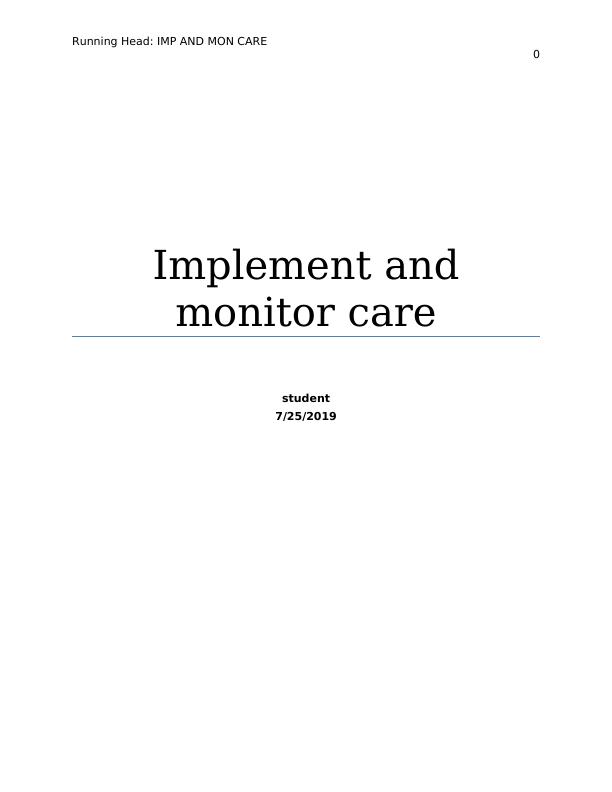
IMP AND MON CARE
1
Answer (Q1);
health issue Etiology Clinical features
acute kidney
injury
Kidney injury or AKI is commonly caused when the
kidneys are injured unexpectedly. The damage may be
caused by insufficient blood flowing by the kidneys, an
injury directly caused to the kidneys or the issue with
the kidneys. A blockage in the uterus, the ducts that
transport the urine form the kidneys to the bladder
Not enough urine,
swelling in the legs,
ankles or feet (Zuk, &
Bonventre, 2016).
Acute
gastrointestinal
disorders
A number of dissimilar situations or diseases can
impact the Gastrointestinal tract and have an influence
on food digestion and/or the overall health of the
patient. Some of the condition that can affect GI
include celiac, disease, constipation, diarrhoea,
Crohn’s disease, GERD, diverticular, vomiting etc.
Bleeding, Bloating,
Constipation, Diarrhea,
Heartburn,
Incontinence, and
Nausea and vomiting
Ischemic stroke the ischemic stroke happens because of atherosclerosis,
which further causes fatty deposits and the
establishment of cholesterol plaque inside the blood
vessels
Face dropping, arm
weakness, speak issues
etc.
Complex
regional pain
syndrome
(CRPS)
The disorder is activated by a strong history of trauma
or harm. The most shared activators are fractures,
sprains/strains, injury to soft tissue, immobilization of
limb, operation, or even small medical processes for
example needle stick.
Constant pain, changes
in skin texture,
abnormal sweating
pattern, and stiffness in
pretentious joints
Asthma Asthma is a disorder in which the airways contracted Shortness of breath,
1
Answer (Q1);
health issue Etiology Clinical features
acute kidney
injury
Kidney injury or AKI is commonly caused when the
kidneys are injured unexpectedly. The damage may be
caused by insufficient blood flowing by the kidneys, an
injury directly caused to the kidneys or the issue with
the kidneys. A blockage in the uterus, the ducts that
transport the urine form the kidneys to the bladder
Not enough urine,
swelling in the legs,
ankles or feet (Zuk, &
Bonventre, 2016).
Acute
gastrointestinal
disorders
A number of dissimilar situations or diseases can
impact the Gastrointestinal tract and have an influence
on food digestion and/or the overall health of the
patient. Some of the condition that can affect GI
include celiac, disease, constipation, diarrhoea,
Crohn’s disease, GERD, diverticular, vomiting etc.
Bleeding, Bloating,
Constipation, Diarrhea,
Heartburn,
Incontinence, and
Nausea and vomiting
Ischemic stroke the ischemic stroke happens because of atherosclerosis,
which further causes fatty deposits and the
establishment of cholesterol plaque inside the blood
vessels
Face dropping, arm
weakness, speak issues
etc.
Complex
regional pain
syndrome
(CRPS)
The disorder is activated by a strong history of trauma
or harm. The most shared activators are fractures,
sprains/strains, injury to soft tissue, immobilization of
limb, operation, or even small medical processes for
example needle stick.
Constant pain, changes
in skin texture,
abnormal sweating
pattern, and stiffness in
pretentious joints
Asthma Asthma is a disorder in which the airways contracted Shortness of breath,
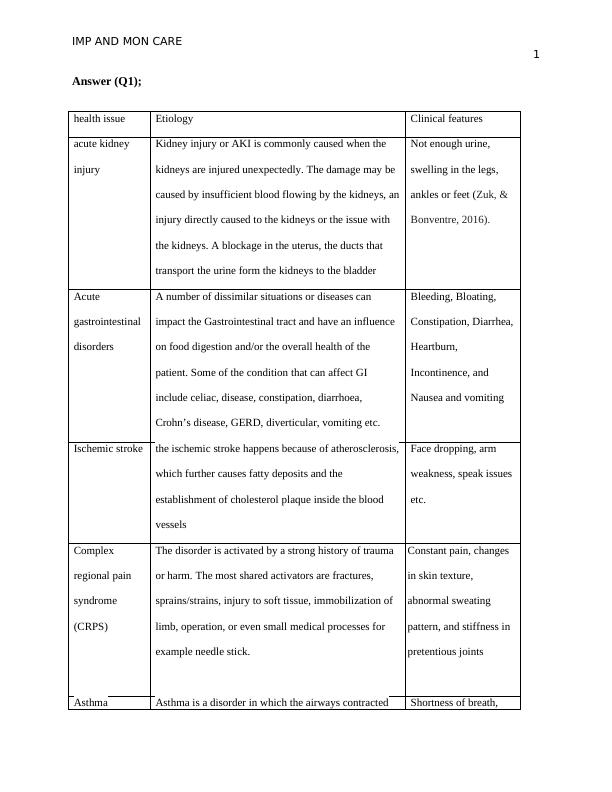
IMP AND MON CARE
2
and swell and create additional mucus which makes
difficult breathing. This can be triggered by allergens,
smoking tobacco, environmental factors like pollution,
obesity, stress, pregnancy etc.
Chest, tightness or
pain, Trouble sleeping
etc.
Acute
unconscious
state
Caused by harm to the brain. Injury to the Brain can be
caused by augmented pressure, haemorrhage, loss of O2,
accumulation of toxins tumour, diabetes, and infection.
The damage can be short-term and permanent
Eyes closed, depressed
brainstem reflexes, no
response of the limbs
and painful stimuli,
irregular breathing et.
Angina pectoris Angina pectoris frequently take place while the muscle
of the heart itself requires additional blood than it is
receiving, for instance, during periods of bodily
activity or sturdy emotion. This can be triggered by
emotional stress, heavy meals, smoking, and exposure
to temperature very hot or cold.
Aching, burning,
discomfort, heaviness,
pressure, and
squeezing.
Cellulitis This can be occurs when the bacteria like
streptococcus and staphylococcus enter inside the skin
through cracks or wounds. It can be caused by injury,
weakened immune system, skin condition, obesity etc.
Red area of skin,
swelling, pain, warmth,
blisters, skin dimpling
etc.
Dehydration Dehydration occurs when the body does not have enough
water as it requires for proper functioning. This can be
caused by fever, diarrhoea, vomiting, excessive sweating,
and peeing too much.
Thirst, dry or sticky
mouth, headache, dry
skin, muscle cramps
etc.
2
and swell and create additional mucus which makes
difficult breathing. This can be triggered by allergens,
smoking tobacco, environmental factors like pollution,
obesity, stress, pregnancy etc.
Chest, tightness or
pain, Trouble sleeping
etc.
Acute
unconscious
state
Caused by harm to the brain. Injury to the Brain can be
caused by augmented pressure, haemorrhage, loss of O2,
accumulation of toxins tumour, diabetes, and infection.
The damage can be short-term and permanent
Eyes closed, depressed
brainstem reflexes, no
response of the limbs
and painful stimuli,
irregular breathing et.
Angina pectoris Angina pectoris frequently take place while the muscle
of the heart itself requires additional blood than it is
receiving, for instance, during periods of bodily
activity or sturdy emotion. This can be triggered by
emotional stress, heavy meals, smoking, and exposure
to temperature very hot or cold.
Aching, burning,
discomfort, heaviness,
pressure, and
squeezing.
Cellulitis This can be occurs when the bacteria like
streptococcus and staphylococcus enter inside the skin
through cracks or wounds. It can be caused by injury,
weakened immune system, skin condition, obesity etc.
Red area of skin,
swelling, pain, warmth,
blisters, skin dimpling
etc.
Dehydration Dehydration occurs when the body does not have enough
water as it requires for proper functioning. This can be
caused by fever, diarrhoea, vomiting, excessive sweating,
and peeing too much.
Thirst, dry or sticky
mouth, headache, dry
skin, muscle cramps
etc.
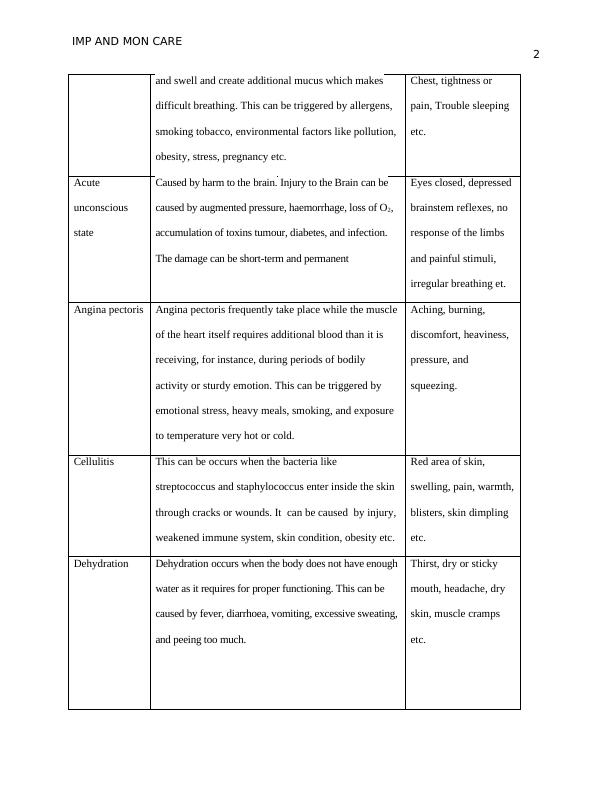
IMP AND MON CARE
3
Hemorrhagic
shock
Hemorrhagic shock is the illness of decreased tissue
perfusion, leads the insufficient delivery of O2 and
necessary nutrients for cellular function. This can be
caused by heavy bleeding, heart down and failure to
transport blood.
Weakness, fatigue,
fainting and dizziness.
concussion A powerful blow to the head and neck or the superior
body can cause the brain to slip back and forward
powerfully against the internal walls of the skull.
Sudden hastening or slowing of the head that is caused
by incidents like a car accident or being brutally
shaken likewise can cause the brain damage. These
injuries impacts functioning of brain, commonly for a
short period, leads to concussion related signs and
symptoms.
Memory issue,
confusion, dizziness,
headache, balance
problems, slowed
reaction to the stimuli
etc.
Myocardial
infarction
Myocardial infarction happens when a coronary
arteries of the heart is obstructed unexpectedly or has
exceedingly slow transport of blood movement. Main
cause of sudden obstruction is the development of a
blood clot also called thrombus.
Chest pain, pressing,
squeezing, crushing,
burning etc.
Nephrolithiasis Nephrolithiasis denotes to the existence of crystalline
stones inside patient’s urinary system that are form
from microscopic crystals within loop of Henle, the
distal tubules, or a collecting vessel. Causes due to
elevated intensities of urinary solutes for example
calcium, uric acid, oxalate, and the sodium, in addition
Pain associated with
back, belly or sides,
pain and bruising
during urination,
fever/chills, vomiting
etc.
3
Hemorrhagic
shock
Hemorrhagic shock is the illness of decreased tissue
perfusion, leads the insufficient delivery of O2 and
necessary nutrients for cellular function. This can be
caused by heavy bleeding, heart down and failure to
transport blood.
Weakness, fatigue,
fainting and dizziness.
concussion A powerful blow to the head and neck or the superior
body can cause the brain to slip back and forward
powerfully against the internal walls of the skull.
Sudden hastening or slowing of the head that is caused
by incidents like a car accident or being brutally
shaken likewise can cause the brain damage. These
injuries impacts functioning of brain, commonly for a
short period, leads to concussion related signs and
symptoms.
Memory issue,
confusion, dizziness,
headache, balance
problems, slowed
reaction to the stimuli
etc.
Myocardial
infarction
Myocardial infarction happens when a coronary
arteries of the heart is obstructed unexpectedly or has
exceedingly slow transport of blood movement. Main
cause of sudden obstruction is the development of a
blood clot also called thrombus.
Chest pain, pressing,
squeezing, crushing,
burning etc.
Nephrolithiasis Nephrolithiasis denotes to the existence of crystalline
stones inside patient’s urinary system that are form
from microscopic crystals within loop of Henle, the
distal tubules, or a collecting vessel. Causes due to
elevated intensities of urinary solutes for example
calcium, uric acid, oxalate, and the sodium, in addition
Pain associated with
back, belly or sides,
pain and bruising
during urination,
fever/chills, vomiting
etc.
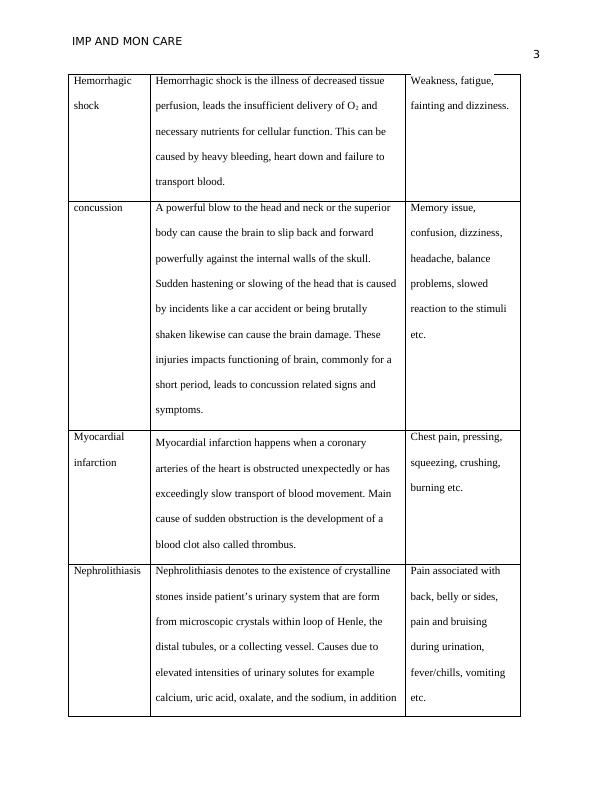
IMP AND MON CARE
4
to reduced intensities of stone inhibitors for example
citrate and magnesium.
Bacterial sepsis Bacterial contaminations are the utmost mutual cause
of sepsis. Any physical contamination can activate the
condition and patient’s lungs, the urinary tract, and
stomach area are chiefly susceptible. This can be
caused by alcohol or drug withdrawal, transfusion
reaction, drug fever, pancreatitis, etc.
Fever and chills, rapid
pulse, nausea and
vomiting, diarrhoea,
rapid breathing, very
low body temperature
etc. (Sweeney, et al.,
2018)
Answer (Q2); A)
Assessment, planning, implementing and evaluating care using a nursing model or
framework.
Managing fluid and electrolyte balance.
Managing nutrition.
Managing pain.
Managing infection control.
Managing wounds and wound care.
Managing stress and anxiety.
Managing possible altered body image (Williams & Hopper, 2015).
B)
4
to reduced intensities of stone inhibitors for example
citrate and magnesium.
Bacterial sepsis Bacterial contaminations are the utmost mutual cause
of sepsis. Any physical contamination can activate the
condition and patient’s lungs, the urinary tract, and
stomach area are chiefly susceptible. This can be
caused by alcohol or drug withdrawal, transfusion
reaction, drug fever, pancreatitis, etc.
Fever and chills, rapid
pulse, nausea and
vomiting, diarrhoea,
rapid breathing, very
low body temperature
etc. (Sweeney, et al.,
2018)
Answer (Q2); A)
Assessment, planning, implementing and evaluating care using a nursing model or
framework.
Managing fluid and electrolyte balance.
Managing nutrition.
Managing pain.
Managing infection control.
Managing wounds and wound care.
Managing stress and anxiety.
Managing possible altered body image (Williams & Hopper, 2015).
B)
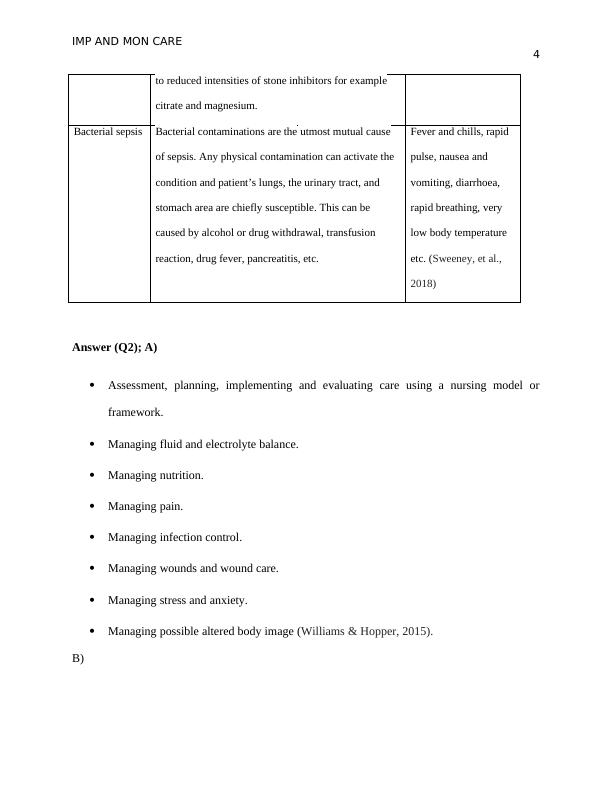
IMP AND MON CARE
5
a) Elective-surgery is the term applied for non-emergency operation which is clinically essential,
but can be postponed for at least one day. Emergency type of surgery is done in response of an
urgent clinical condition (such as appendicitis and trauma) (Mullen, et al., 2017).
b)
Local Block the conduction of nerve impulses deprived of causing
unconsciousness
General Bring about a condition of unconsciousness
Epidural Anesthesia introduced into the epidural space nearby the spine
Spinal Anesthesia directed in the inferior back/lumbar area by applying spinal needle
peripheral nerve
block
inserted near a particular nerve or the bundle of nerves
c) Amputation: Elimination of portion or the body part that is surrounded by the skin.
Amputation is also performed as a surgical procedure; it can happen at a site of accident.
d) An open reduction and the internal fixation (ORIF) is a kind of operation applied to fix the
damaged bones. Open reduction is where a fracture fragments are unprotected surgically by cut
up the tissues.
e) Hip replacement operation is a process in which a clinician surgically eliminates a hurting hip
joint have arthritis and substitutes it with an synthetic joint frequently made from metallic and
plastic constituents.
5
a) Elective-surgery is the term applied for non-emergency operation which is clinically essential,
but can be postponed for at least one day. Emergency type of surgery is done in response of an
urgent clinical condition (such as appendicitis and trauma) (Mullen, et al., 2017).
b)
Local Block the conduction of nerve impulses deprived of causing
unconsciousness
General Bring about a condition of unconsciousness
Epidural Anesthesia introduced into the epidural space nearby the spine
Spinal Anesthesia directed in the inferior back/lumbar area by applying spinal needle
peripheral nerve
block
inserted near a particular nerve or the bundle of nerves
c) Amputation: Elimination of portion or the body part that is surrounded by the skin.
Amputation is also performed as a surgical procedure; it can happen at a site of accident.
d) An open reduction and the internal fixation (ORIF) is a kind of operation applied to fix the
damaged bones. Open reduction is where a fracture fragments are unprotected surgically by cut
up the tissues.
e) Hip replacement operation is a process in which a clinician surgically eliminates a hurting hip
joint have arthritis and substitutes it with an synthetic joint frequently made from metallic and
plastic constituents.
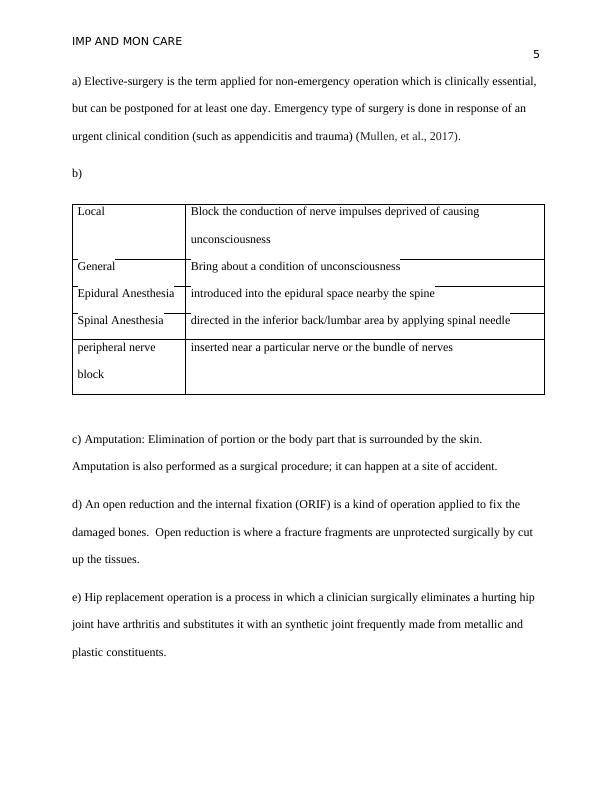
End of preview
Want to access all the pages? Upload your documents or become a member.
Related Documents
Nursing: Clinical Features and Principles of Surgical Nursinglg...
|14
|2617
|105
HLTENN011 Implement and monitor care for a person with acute health problems Assessment 2022lg...
|18
|3114
|8
Management 0f Acute Condition Question Answer 2022lg...
|36
|7892
|33
Nursing Assessment: Etiology and Clinical Features of Acute Health Problemslg...
|43
|12116
|309
Implement and Monitor Care for a Person with Acute Health Problemslg...
|14
|3880
|29
Acute Health Problems and Surgical Nursing: A Holistic Care Approachlg...
|26
|7041
|91
